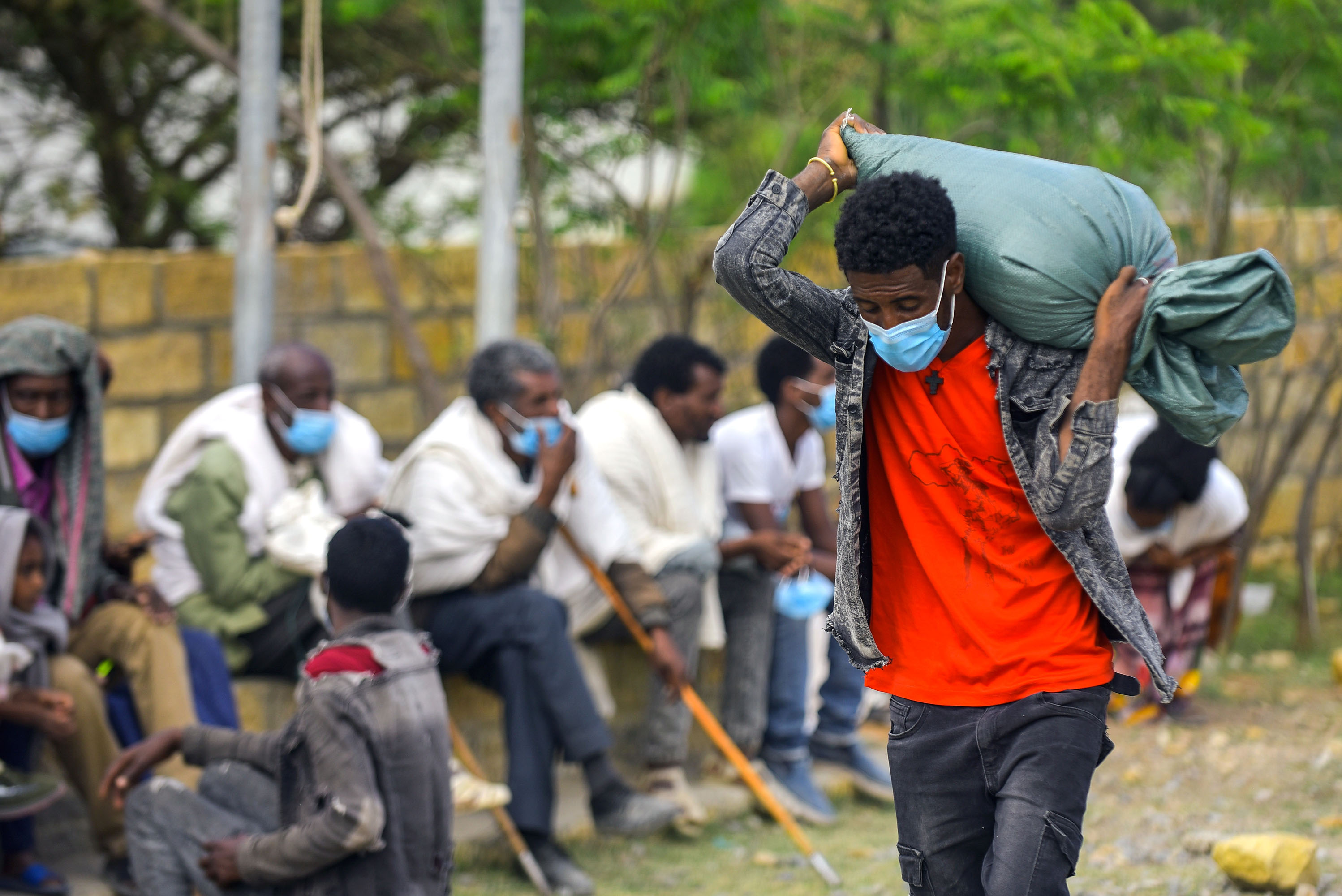Tigray: Time is running out to avert worrying levels of food insecurity
Farmers need urgent support to plant in the coming weeks

Farmers, wearing protective face masks, carrying seed bags received from FAO at a distribution centre, Mai-Mekden village, Tigray region, Ethiopia, May, 2021.
©FAO/Michael Tewelde
Rome – Farmers in parts of northern Ethiopia are in serious danger of losing the main planting season (June-August) if they do not receive urgent support from the international community to sow their fields, which would further deteriorate the already serious food security situation in the region.
With the rainfall outlook foreseen to be favourable, the season offers a crucial and cost-effective opportunity to improve food availability across the region. Most farmers in Tigray have completed land preparation and are waiting for the onset of the rains. However, limited access to agricultural inputs, particularly fertilizers and seeds, is a major threat to the season.
FAO and its Agriculture Cluster partners are seeking to mobilize $96 million immediately, focusing specifically on the time-sensitive opportunity offered by the Government of Ethiopia to purchase fertilizers at cost price.
Over the last months, FAO and partners have mobilized $11 million, which enables them to meet just 10 percent of needs for fertilizers, leaving a gap of $85 million.
FAO and partners are also exploring avenues to make 60 000 tonnes of fertilizers and locally-produced seed available to farmers (4 000 tonnes of seed, or 8 percent of the total needs). Given the very short window for planting (end-June to August), the first priority should be given to fertilizer, which is applied three to four weeks after planting.
“The importance of supporting food production in Tigray cannot be overstressed. It is highly unlikely that the region will be able to produce sufficient food for its population without the appropriate seeds and fertilizers. Every dollar invested now in food production has a multiplying effect, and it turns into four to seven dollars worth of food. At the same time, bringing in food assistance at a later stage will be much more expensive,” said David Phiri, FAO Representative for Ethiopia a.i. “At the same time, FAO is advocating to increase financial, material and technical support to other areas affected by the conflict, such as Amhara and Afar. Access to these areas is considerably easier, but material support has not been adequate” he added.
If support is provided in time for the Meher planting season, families will be able to harvest and start consuming staple foods by October 2022. These harvests would cover their food needs for at least six months, and in the best case scenario, up to the next harvest for significant proportion of the households, with surplus to sell. The vegetables produced during the off-season would further reinforce their food security.
Without these inputs, the next harvests will not be available before October 2023, extending the hunger season for a further year, and increasing humanitarian food needs even more.
“We are in the midst of the critical planting season. There is a small window of opportunity to prevent severe hunger by supporting local production and averting a potential increase in humanitarian food needs over the next year,” said Rein Paulsen, Director of the FAO Office of Emergencies and Resilience. “The successful planting season will also support recovery efforts and the sustainable return of displaced families and secure food in urban areas”.
In 2021, Tigray’s farmers produced 900 000 tonnes of staple foods, accounting for 40 percent of normal production, equivalent to seven to eight months of annual cereal needs for the region. With limited humanitarian assistance and commercial supplies, the rainfed crops and irrigated vegetables have been key to the survival of Tigray’s rural families, including some 1.8 million internally displaced people, about 60 percent of whom reside within host communities.
The production in 2021 was possible because farmers had access to improved seeds and fertilizers provided by the Government and Agriculture Cluster partners.
Contact
Irina Utkina FAO News and Media (Rome) +39657052542 [email protected]
FAO News and Media (+39) 06 570 53625 [email protected]
